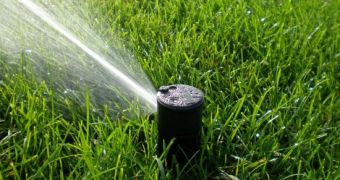For several decades now, China's economy and industrial sector have pretty much been in overdrive. The result is that, some 30 years ago, major urban areas in this country got to find out firsthand what through-the-roof air pollution was all about.
According to researcher Shaocai Yu with the Zhejiang University in China, and the North Carolina State University in the United States, the country still has a chance to solve its ongoing pollution crisis.
What's more, it could put an end to this problem using nothing but good old water, and some sprinklers.
Writing in a recent issue of the journal Environmental Chemistry Letter, Shaocai Yu details that, in order to clean the air hovering over its major cities, China must install sprinklers atop tall buildings and towers.
The next step would be to use these sprinklers to spray water into the atmosphere. The water would eventually fall back on the ground (long live gravity), and would take air pollutants down with it.
As explained on Springer, the entire process would not be very different from watering a garden. The garden would be an oversized one, granted, but the same rules would apply.
Specialist Shaocai Yu argues that, although some might be tempted to add various chemical compounds to the water in order to make it more efficient in terms of collecting and removing pollutants from the air, this might not be such a good idea.
The researcher says that the process should be kept as natural as possible, simply because adding more chemical compounds to the mixture might backfire and end up causing further damage to the environment.
Shaocai Yu expects that his geoengineering approach could help lower fine particle concentrations in the air over China to 35 micrograms per cubic meter.
“With careful and considered evaluation beforehand for each area in the cities, this geoengineering approach can be environmentally safe without significant side effects. It can also be deployed easily within communities and on a massive scale at low cost,” Shaocai Yu writes in his paper.
“If you can spend half an hour watering your garden, you can also spend 30 minutes watering your ambient atmosphere to keep the air clean with this technique,” the specialist adds.
Shaocai Yu is confident that, once it lands back on the ground, the water can be collected, cleaned up and then reused to remove some more pollutants from the air over China. Doing so would ensure that water resources are not overexploited.

 14 DAY TRIAL //
14 DAY TRIAL //